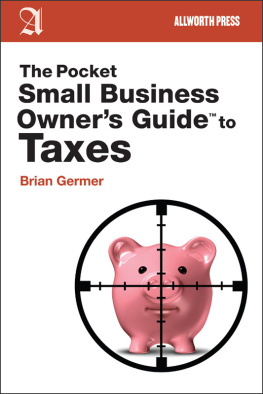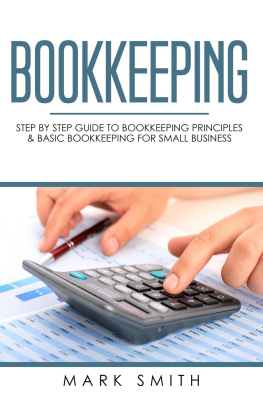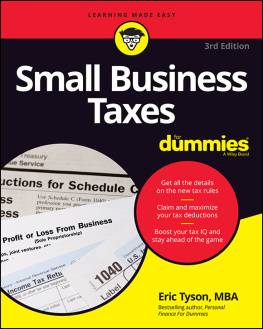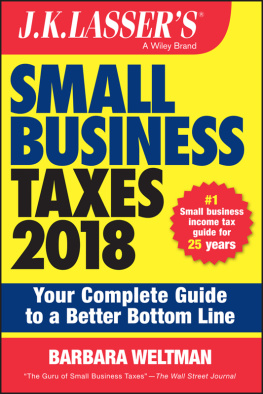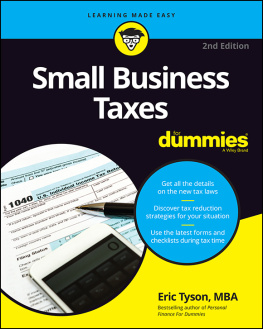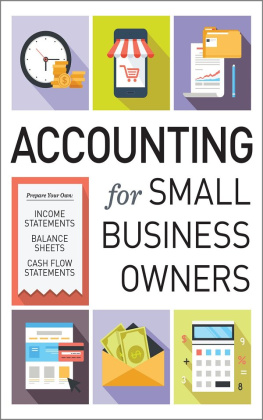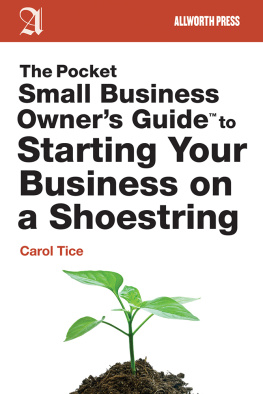The Pocket
Small Business
Owners Guide to
Taxes
Brian Germer

This book is dedicated to my wife and best friend, my two children, and my family for all the love and support.
Copyright 2012 by Brian Germer
All rights reserved. Copyright under Berne Copyright Convention, Universal Copyright Convention, and Pan American Copyright Convention. No part of this book may be reproduced, stored in a retrieval system, or transmitted in any form, or by any means, electronic, mechanical, photocopying, recording or otherwise, without the express written consent of the publisher, except in the case of brief excerpts in critical reviews or articles. All inquiries should be addressed to Allworth Press, 307 West 36th Street, 11th Floor, New York, NY 10018.
This book is designed to provide accurate and authoritative information with respect to the subject matter covered. It is sold with the understanding that the publisher is not engaged in rendering legal, accounting, or other professional services. If legal advice or other expert assistance is required, the services of a competent attorney, accountant, or other professional person should be sought. While every attempt is made to provide accurate information, the author and publisher cannot be held accountable for any errors or omissions.
Allworth Press books may be purchased in bulk at special discounts for sales promotion, corporate gifts, fund-raising, or educational purposes. Special editions can also be created to specifications. For details, contact the Special Sales Department, Allworth Press, 307 West 36th Street, 11th Floor, New York, NY 10018 or info@skyhorsepublishing.com.
15 14 13 12 11 5 4 3 2 1
Published by Allworth Press
An imprint of Skyhorse Publishing, Inc.
307 West 36th Street, 11th Floor, New York, NY 10018.
Allworth Press is a registered trademark of Skyhorse Publishing, Inc., a Delaware corporation.
www.allworth.com
Cover design by Brian Peterson
Library of Congress Cataloging-in-Publication Data
Germer, Brian.
The pocket small business owners guide to taxes / by Brian Germer.
p. cm.
Includes index.
ISBN 978-1-58115-920-2 (pbk. : alk. paper)
1. Small businessTaxationUnited States. 2. Small businessUnited StatesAccounting.
I. Title.
HD2346.U5G47 2012
343.73068dc23
2012022755
Printed in the United States of America
Table of Contents
Are You Self-Employed or an Employee?
Self-Employment Tax and the Corporate Equivalent
Income Tax
Payroll Taxes
Penalties, Fees, and Other New Revenue Raisers
State and Local Taxes
What is Taxable Business Income?
What is Not Taxable Income?
When Does it Become Taxable Income?
Service Business Income Reporting Issues
What is Cost of Goods Sold?
How Do I Track Inventory and Cost of Goods Sold?
What Can Be Deducted?
What Cannot Be Deducted?
When Can the Deductions Be Taken?
How Much Can Be Deducted?
What is a Fixed Asset?
When Does Depreciation Begin?
What Assets Cannot Be Depreciated?
What is the Section 179 Deduction?
What is Bonus Depreciation?
What is MACRS Depreciation?
Special Cases
Repairs vs. Improvement
Sale, Disposals, and Trade-ins
How Should I Classify Payments to Workers?
Do I Need an Employer Identification Number?
What is Taxable Employee Compensation?
When is Payroll Reported and Deducted?
Which Payroll Taxes Are Employers Subject To?
When Are Payroll Tax Deposits Due?
What Payroll Tax Reports Are Required?
Why is Accounting Important?
The Essential Accounting Basics
What is an Accounting System?
What are Accounting Methods?
When is an Accounting Method Selected?
The Cash Basis Method
The Accrual Basis Method
Can I Change Accounting Methods?
Avoid Tax Reporting Over-Complication
How Should I Keep My Records?
The $200 Accounting Solution Myth
Strategies for Efficient Setup of Accounting Software Files
Maintaining Organized and Accurate Books
What Your Tax Professional Should Provide
Business Structure Considerations
Business Structure Options
S Corporation Basics
The Most Popular Tax Benefit of the S Corporation
What are Distributions?
What are Shareholder Loans?
Shareholder Basis: The Key to Deductible Losses
Reporting Health Insurance for Shareholders
Late Filing Penalties
Self-Employment Tax
Basis for LLC Members
Late Filing Penalties
The Correct Way to Maximize Your Deductions
What is Deductible?
What Qualifies As Business Use of a Vehicle?
Maximizing Your Business Miles?
How is the Vehicle Deduction Calculated?
Which Method Provides the Larger Deduction?
Depreciation and Disposal Considerations
All Vehicles Are Not Treated Equally
Maximizing Your Vehicle Depreciation Deduction
Bonus Depreciation
Disposition of Vehicles
Travel vs. Local Transportation Expenses
What is Considered Traveling Away From Home?
Where is Your Tax Home?
What is Deductible?
Many Ways to Travel, Many Different Rules
What Entertainment Can Be Deducted?
Two Tests of Deductibility
Limitations on Meals and Entertainment
How Much Can I Deduct?
Personal vs. Business Entertainment
Country Clubs and Golf and Athletic Clubs
Entertainment Expense Recordkeeping
Why Set Up a Retirement Plan?
Understanding the Basics of Retirement Plans
The Individual Retirement Account (IRA) Alternative
Qualified Plan Contribution Limits and Tax Considerations
Simplified Employee Pension Plans (SEPs)
Solo 401k (Individual 401k)
SIMPLE IRAs
The 401k
Profit Sharing Plan (PSPs)
Defined Benefit Plan (DBPs)
Other Options for High-Income Business Owners
How Do I Setup a Retirement Plan?
Tax Credit for Starting a New Plan
What Qualifies as an Office in Home?
Corporations and the Office in Home Deduction
Calculating the Office in Home Deduction
Advantage to Renters
The Depreciation Tax Trap
The HIRE ActMake Sure You Didnt Miss It!
Small Business Health Care Tax Credit
Eligible Business Structures
Eligible Family Employees
How the Strategy Works
How Much Should I Pay Them?
Reduced Tax Savings for the Ineligible
Introduction
Over and over again courts have said there is nothing sinister in so arranging ones affairs as to keep taxes as low as possible. Everyone does so, rich or poor; and all do right, for nobody owes any public duty to pay more than the law demands...
Judge Learned Hand
The above quote perfectly encapsulates the most effective way for small business owners to maximize deductions and keep taxes as low as possible, and that is done by first finding what the law demands and then arranging ones affairs to meet what the law requires. Too many small businesses owners do not take the time to dig in and learn tax deduction rules, and so they end up failing to take advantage of important deductions they are permitted to take, while taking other deductions they are not even entitled to. Even worse, many small business owners keep very poor records to document the deductions they do claim, which is a recipe for disaster if they are ever audited.

